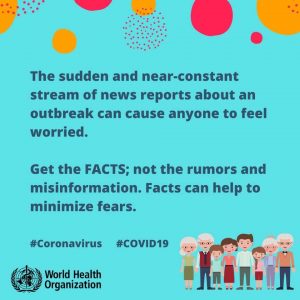Focus on what is in your control
Part of what makes the coronavirus so scary is that we don’t know what to expect. Right now, we’re waiting to see how COVID-19 will affect the US and it’s a very uneasy feeling, especially if you already run a little anxious.
So what can you do? Be the master of your own environment. Wash your hands. Clean your home. Make your own meals in a clean kitchen. If possible, find ways to enjoy the free-time that Shelter-in-Place order in the Bay Area gives you to read a book, paint, or garden.
 Stay informed, but turn the news off periodically
Stay informed, but turn the news off periodically
It’s important to stay informed and wait to see how COVID-19 will affect public safety. The World Health Organization is one of the best sources of information on the virus at this time as they’ve been studying it since it’s outbreak in China. The California Department of Public Health website is a good source of local news. Fact-check any memes or well-intended advice going around the internet.
Make sure that you take time to unplug. Turn off the TV, put down the newspaper, and log-off of social media for at least half of your waking hours. If don’t know what to do with yourself, try a bit of redirection by reading a book, calling a friend, or streaming a new show.
Notice your thoughts
Try to notice if you are having repetitive anxious or negative thoughts. Write them down. Look at them and ask yourself if they are true. Then read them and see if your fears hold within them a hope or a desire. Sit with that and see if you can formulate some action steps to move closer to that goal or hope.
Be gentle with yourself if this feels threatening. You can always walk away and come back to it as you feel ready.
Stay connected
You can maintain social distance without being isolated. Reach out to the people you care about via Facetime and phone. Stay involved in your community by buying gift certificates to your local coffee shop, restaurants, and other in-person based businesses to use after this passes.
 Exercise
Exercise
Exercise helps your body discharge adrenaline, a stress hormone. It’s a great way to deal with stress and maintain your health. Connect with nature and go for a walk outside. With the rain, it should be a wonderful week for waterfall hikes.
 Be mindful of your caffeine intake
Be mindful of your caffeine intake
A warm mug of coffee or tea can feel comforting in times of uncertainty, but it also contains caffeine, which speeds up your heart rate and can make you feel more anxious. Consider reducing your caffeine intake and supplementing with or switching to decaf.
Instead, consider making a Cacao Shroom Latte. There is a reason that Chelsea of Bol Superfood Cafe in Mill Valley, who was generous enough to share this recipe with us, calls it “Hug-in-a-Mug.” In addition to being delicious, it is super calming AND it bolsters your immune system.
Take 1 teaspoon of Mushroom Alliance, which you can order online from Gathering Thyme, blend with 1 tablespoon powdered raw organic cacao, 1 teaspoon maca powder, 1/2 teaspoon of cinnamon powder, and 12 oz. of warm plant milk. If you have a frother, use it to blend. If not, a good old-fashioned spoon will do the trick.
 Remember to eat breakfast
Remember to eat breakfast
Two of the first questions I ask people who come into the clinic wanting help with anxiety are, “Do you start your day with coffee?” and “Do you eat breakfast?”
Skipping breakfast and fueling up on caffeine starts the day with your body on high alert. Breakfast helps you relax by giving you the needed nutrients to function properly. High-protein, high-fat foods like eggs and smoothies with nut butter will also help regulate your blood sugar, and keep you from crashing and feeling anxious mid-afternoon.
 Take a nap
Take a nap
I understand this one may be challenging for those of you with kids at home or who work hourly jobs. If you can work from home without the interruption of small children, why not enjoy the luxury of a midday nap? Sleep is one of the best ways to support our immune system and it’s free. If your body is telling you to rest, why not take a nap or go to bed early during this time when immune health is of the essence?
For more thoughts as to how to manage your anxiety during these unsettling times, please read Doreen Marshall’s excellent article “Taking Care of Your Mental Health in the Face of Uncertainty.”
